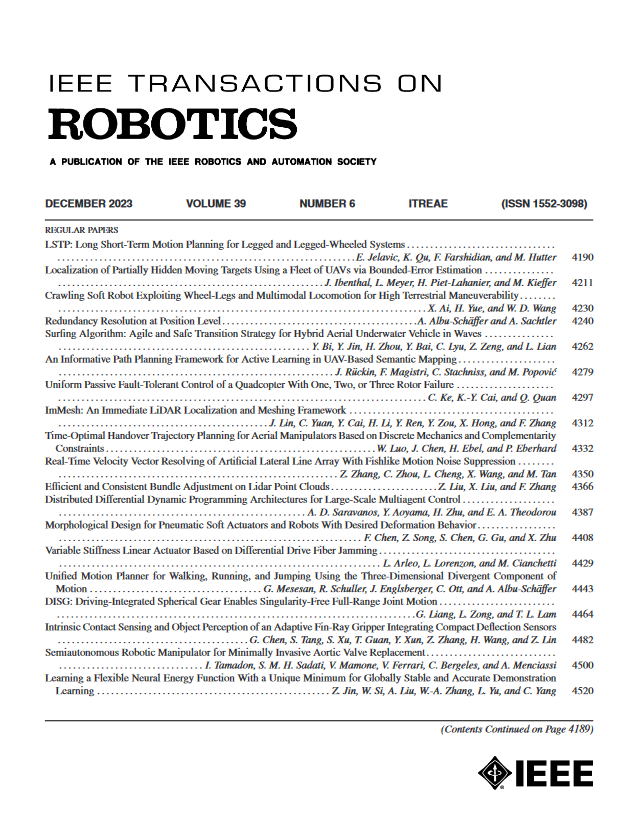CODEI: Resource-Efficient Task-Driven Codesign of Perception and Decision Making for Mobile Robots Applied to Autonomous Vehicles
IF 9.4
1区 计算机科学
Q1 ROBOTICS
引用次数: 0
Abstract
This article discusses the integration challenges and strategies for designing mobile robots, by focusing on the task-driven, optimal selection of hardware and software to balance safety, efficiency, and minimal usage of resources such as costs, energy, computational requirements, and weight. We emphasize the interplay between perception and motion planning in decision-making by introducing the concept of occupancy queries to quantify the perception requirements for sampling-based motion planners. Sensor and algorithm performance are evaluated using false negative rate and false positive rate across various factors such as geometric relationships, object properties, sensor resolution, and environmental conditions. By integrating perception requirements with perception performance, an integer linear programming approach is proposed for efficient sensor and algorithm selection and placement. This forms the basis for a codesign optimization that includes the robot body, motion planner, perception pipeline, and computing unit. We refer to this framework for solving the codesign problem of mobile robots as CODEI, short for codesign of embodied intelligence. A case study on developing an autonomous vehicle for urban scenarios provides actionable information for designers, and shows that complex tasks escalate resource demands, with task performance affecting choices of the autonomy stack. The study demonstrates that resource prioritization influences sensor choice: cameras are preferred for cost-effective and lightweight designs, while lidar sensors are chosen for better energy and computational efficiency.应用于自动驾驶汽车的移动机器人感知与决策的资源高效任务驱动协同设计
本文讨论了设计移动机器人的集成挑战和策略,重点关注任务驱动的硬件和软件的最佳选择,以平衡安全性、效率和最小的资源使用(如成本、能源、计算需求和重量)。我们通过引入占用查询的概念来量化基于采样的运动规划器的感知要求,强调决策中感知和运动规划之间的相互作用。传感器和算法的性能评估使用假阴性率和假阳性率跨各种因素,如几何关系,对象属性,传感器分辨率和环境条件。将感知需求与感知性能相结合,提出了一种有效的传感器和算法选择与放置的整数线性规划方法。这构成了包括机器人本体、运动规划器、感知管道和计算单元在内的协同设计优化的基础。我们将这个解决移动机器人协同设计问题的框架称为CODEI,即具身智能协同设计的缩写。一项针对城市场景开发自动驾驶汽车的案例研究为设计人员提供了可操作的信息,并表明复杂的任务会增加资源需求,任务性能会影响自动堆栈的选择。该研究表明,资源优先级影响传感器的选择:首选相机的成本效益和轻量化设计,而激光雷达传感器的选择更好的能源和计算效率。
本文章由计算机程序翻译,如有差异,请以英文原文为准。
求助全文
约1分钟内获得全文
求助全文
来源期刊

IEEE Transactions on Robotics
工程技术-机器人学
CiteScore
14.90
自引率
5.10%
发文量
259
审稿时长
6.0 months
期刊介绍:
The IEEE Transactions on Robotics (T-RO) is dedicated to publishing fundamental papers covering all facets of robotics, drawing on interdisciplinary approaches from computer science, control systems, electrical engineering, mathematics, mechanical engineering, and beyond. From industrial applications to service and personal assistants, surgical operations to space, underwater, and remote exploration, robots and intelligent machines play pivotal roles across various domains, including entertainment, safety, search and rescue, military applications, agriculture, and intelligent vehicles.
Special emphasis is placed on intelligent machines and systems designed for unstructured environments, where a significant portion of the environment remains unknown and beyond direct sensing or control.
 求助内容:
求助内容: 应助结果提醒方式:
应助结果提醒方式:


